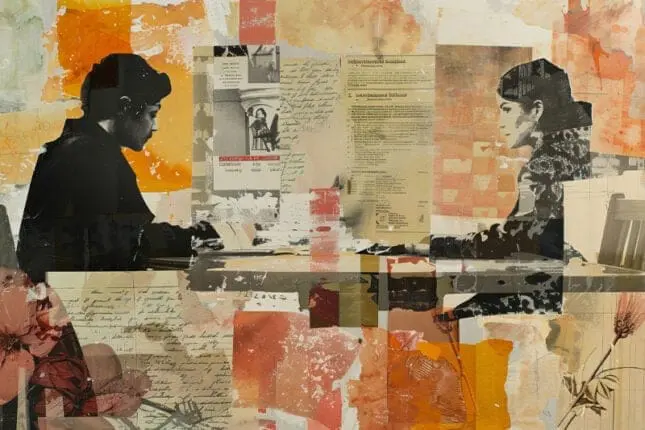Q: How do I respond when a client (or a client’s lawyer) requests my session notes?
A: Recently, I saw a former client’s name in my inbox next to the subject line “Divorce Proceeding: Request for Documents.” He asked for all the notes and records from couples sessions I’d facilitated five years ago, then noted that his attorney needed them by next week. Yikes! I took a deep breath. How was I supposed to handle this? Was I obligated to send the notes? What if the things I’d written were misinterpreted? Rapid-fire worries hit me from all directions. My mind raced. Would I be subpoenaed? Deposed? Was there a risk of being brought up on charges at my state’s licensing bureau, or being in contempt of court?
As I scoured the internet for information, I stumbled on an article by Steven Anderson, a lawyer who specializes in mental health law. The next day, we set up a time to talk. At the start of our conversation, he warned me that because he was based in Seattle, the specific rules and regulations governing document requests might not apply in my state. Still, he walked me through some basic principles to remember when handling document requests.
Chill out. When a client requests documents for legal reasons out of the blue, it can feel scary and important to respond immediately. But the situation is rarely (if ever) as urgent as it seems to be in the moment. Give yourself a day (or three) to wrap your mind around the request. Listen to a symphony. Go for a walk. Meditate. Eat a cookie. Talk to a trusted colleague. Let the request percolate.
Reflect on your reaction to the request. Do you feel insecure? Angry? Vulnerable? If you feel pressured, what emotions feed this sense of urgency? Are you afraid the notes will reflect poorly on you as a clinician? Are any feelings coming up about the work you did with the client or couple whose treatment you documented?
In my case, though several years had passed since I saw my former clients, I still felt sad about the way our work had ended. My bond with both partners had been strong, and we’d had some meaningful sessions; but ultimately, the therapy hadn’t made enough of a difference, and they’d ended treatment. Reflecting on my feelings helped me accept my sadness and regret about this outcome and focus on the task at hand: figuring out what to do about the document request.
Reach out to colleagues for support. Briefly let a few of your most-trusted colleagues know about your situation (while taking care not to reveal identifying client information) and get their input. It turns out that all four therapists I reached out to had been in similar situations. Though they’d each handled the document request differently, most of them had sought counsel from an attorney specializing in HIPAA regulations and client-therapist confidentiality issues in the state where they were licensed to practice, and everyone had been careful to obtain consent before communicating with a client’s attorneys.
One colleague let the document requester know she’d need their partner’s consent to release the documents about their couples therapy—and never heard back. Another colleague (who’d received a subpoena) shared his (very high) fee per day for court appearances—and never heard back. A third colleague asserted client-therapist privilege after being deposed—and the deposition was dropped. A fourth colleague advised me to communicate with my liability insurance company because chances were, they offered free advice through an attorney on their staff.
After my conversation with Anderson, I emailed the American Psychological Association (APA). They sent me three documents highlighting important things to consider, such as how to handle subpoenas, court orders, and depositions, and what to keep in mind about the difference between confidentiality (laws and ethical standards requiring therapists to protect patients’ privacy) and psychotherapist-patient privilege (the patient’s legal right to keep their personal treatment information out of court proceedings).
Respond succinctly to your client’s request. When I first opened my former client’s email, I had a brief fantasy that it would magically disappear from my inbox if I pretended that I’d never received it. Of course, ghosting a client isn’t just irresponsible, it’s unethical. You must respond to document requests; however, you can do so in an honest, thoughtful note that clarifies what you can and can’t do as you handle the situation.
There are different rules in different states about the number of days you have before you need to respond, but in most situations, you can take a week or two. You don’t have to first understand every nuance of HIPAA legalities in your state, or all the ins and outs of malpractice issues, to provide an initial response. You’re a therapist, not a lawyer. You can reply as a therapist, briefly sharing your plan. In my case, after three days, I wrote this:
I received your request for documents. I need to consult with the licensing board in my state and with my professional counseling association regarding state-specific HIPAA and client confidentiality issues in this situation. Unfortunately, I won’t be able to fulfill your request by the deadline you mentioned, but once I have more information, I’ll get back to you.
Assess your notes. The night I got the document request, I slept poorly. The following day, after I started mining various resources for guidance, I located and looked through my old session notes. Anderson had advised me to make note of anything that a lawyer or judge might view as indicative of a personality disorder, and to assess what I’d written to see if it revealed a negative bias toward one or the other partner. Certain diagnoses or biases that show up in session notes can be weaponized against a parent in a custody battle. My former clients don’t have children, so this wasn’t a concern in my case.
But I still asked myself two questions: “Are these notes general and generic, or full of specifics and revealing details?” Sadly, detailed notes—though helpful as a tool for therapists—can work against clients’ safety when they’re made public or used in legal proceedings. If notes are general—a few sentences, limited details, widely applicable statements about goals or treatment plans—a therapist may feel more comfortable releasing them to a third party. “Do these notes reflect poorly on the client, or in the case of a couple, on one partner?” It’s important to consider whether notes reflect a bias where you may have sided with one partner. When your notes detail a partner’s missteps and insensitive behaviors, they can be used to gain legal leverage. At the same time, omitting details regarding a partner’s abusive behaviors to protect them from hypothetical future court proceedings isn’t ethical. Ultimately, if you feel your notes are biased or may work against a client’s interests, it’s best to let a client or client’s attorney know.
If the requested documents are notes from conjoint therapy, it’s your ethical duty to assert privilege on behalf of both partners in the couple. This means you’re bound to protect both clients’ rights to privacy and confidentiality and you’ll need signed consent from both partners to release notes. You’re protecting them but also yourself. Disregarding your responsibility to both clients could result in one partner filing a complaint with a regulatory agency.
***
A few days after my first email—after working through my reactions, doing research, and consulting with people who knew more than I did on the topic, I formulated this more detailed response:
Because you were both my clients during couples sessions, I would need signed releases from both of you giving me permission to forward these documents to you and your respective attorneys. I am also concerned that there are personal details in the notes which were revealed in trusting circumstances. These details were not intended for public scrutiny or to be taken out of context. Let me know if you or your attorney would like to discuss these concerns with me on a call.
A few days later, my former client’s attorney responded that at this time, they didn’t need the records. A follow up to this request—or a new one—may surface again in my email inbox down the road. But if it does, I’ll feel prepared.
Alicia Muñoz
Alicia Muñoz, LPC, is a certified couples therapist, and author of several books, including Stop Overthinking Your Relationship, No More Fighting, and A Year of Us. Over the past 18 years, she’s provided individual, group, and couples therapy in clinical settings, including Bellevue Hospital in New York, NY. Muñoz currently works as a senior writer and editor at Psychotherapy Networker. You can learn more about her at www.aliciamunoz.com.










